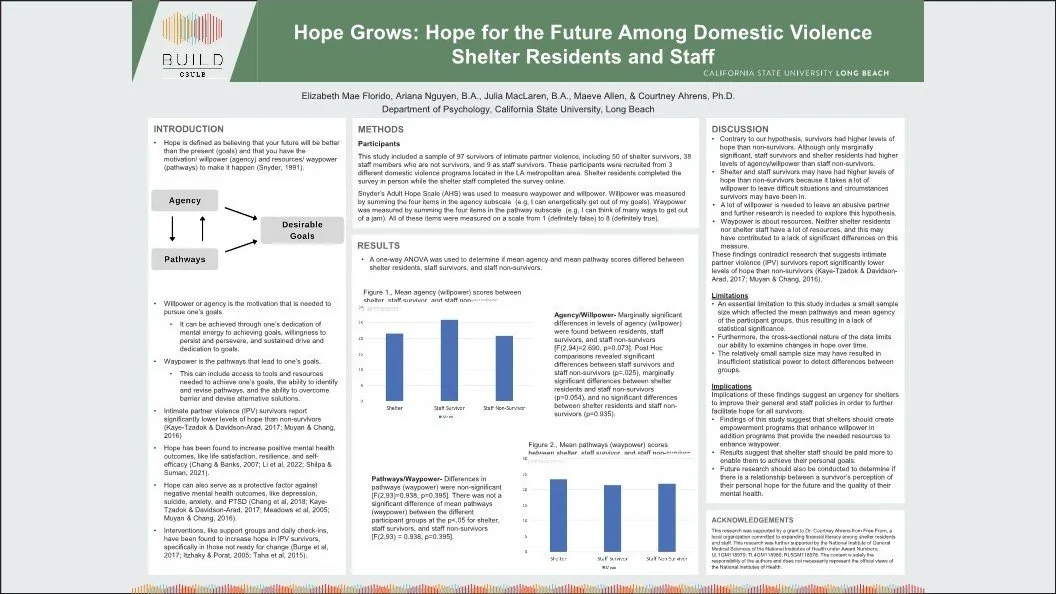Poster #16
Hope Grows: Hope for the Future Among Domestic Violence Shelter Residents and Staff
By: Elizabeth Mae Florido. Co-authored by Courtney Ahrens, Ph.D.
Abstract:
Hope can significantly improve the physical and mental outcomes of intimate partner violence survivors and serve as a protective factor against further trauma and institutional betrayal, yet it is common for victims of interpersonal violence to have little hope for the future. To determine whether hope for the future varies by survivor status, the current study compares hope for the future among: (1) shelter residents, (2) staff survivors, and (3) non-survivor staff members. Snyder’s Adult Hope Scale (AHS), which includes questions pertaining to willpower (i.e., the internal motivation to pursue goals) and way power (i.e., access to resources necessary to achieve goals), was used to measure hope for the future using an 8-point scale ranging from 1 (definitely false) to 8 (definitely true). Participants were recruited from 3 domestic violence organizations located in the LA metropolitan area, including 50 shelter residents, 9 shelter staff who identified as survivors, and 38 shelter staff who did not identify as survivors. Results of a series of between subjects ANOVAs yielded a marginally significant differences willpower (F (2,94) = 2.69, p= .073) with staff survivors having significantly higher levels of agency (M= 26, SD = 1.99) than staff who are not survivors (M= 20.89, SD = .96). Differences in way power were not significant, however, F (2, 93) = 0.94 ns., with mean levels of pathway ratings relatively similar across all three groups. These findings suggest that surviving intimate partner violence may lead to higher levels of hope, particularly over the long term. Implications of these findings suggest shelter and staff policies should facilitate hope for both residents and staff members alike.
elizabeth mae florido
Elizabeth Mae Florido is a 4th year undergraduate student attending California State University at Long Beach pursuing a Bachelor of Science in Molecular Cell Biology and Physiology with minors in Psychology and Chemistry. Their research concentrates on violence against women including sexual assault and domestic violence primarily focusing on the supportive services provided by Title IX offices on college campuses. They are also a Crisis Intervention Counselor volunteering with Crisis Text Line and provides a judgement-free space for people in crisis to discuss stressors and collaborate with them to create healthy coping skills and personalized plans for their immediate and long-term safety.
Courtney Ahrens, pHD
Dr. Courtney Ahrens is a Professor in the Department of Psychology at California State University at Long Beach. Her scholarly work focuses on violence against women with a particular focus on community-based and policy-oriented research. Her research has been funded by the National Institute of Justice and non-profit organizations such as the Joyful Heart Foundation and Free From. Throughout her career, Dr. Ahrens has remained actively involved with campus and community based organizations to prevent, respond to, and eliminate sexual assault and intimate partner violence. She has worked with the National Institute of Justice, the US Office on Violence Against Women, and the US Embassy in Vietnam as an invited speaker, roundtable participant, and grant reviewer. Her work has resulted in numerous awards from both local and national organizations. She received her undergraduate degree from Smith College and a doctoral degree in Community Psychology from the University of Illinois at Chicago.

